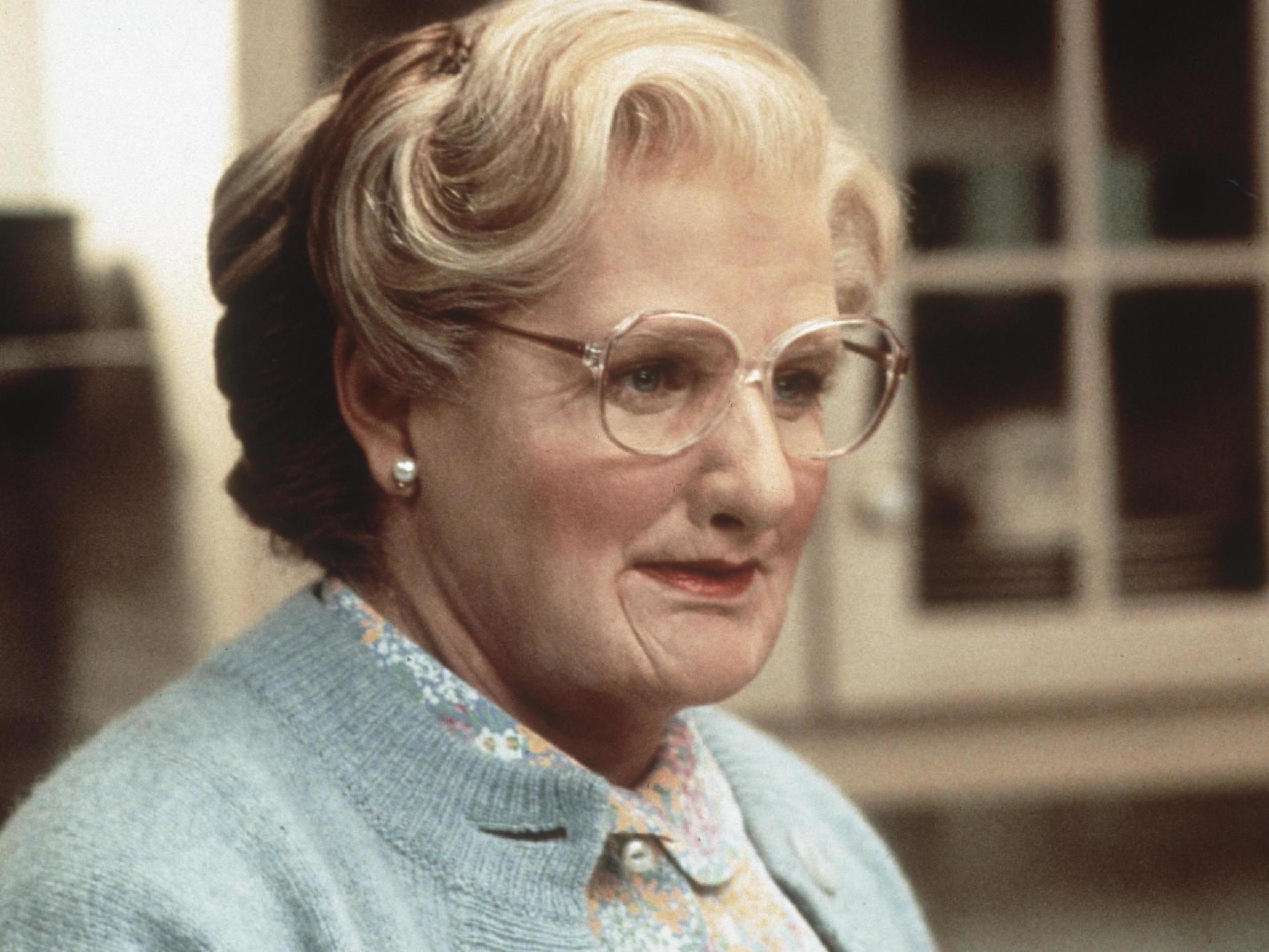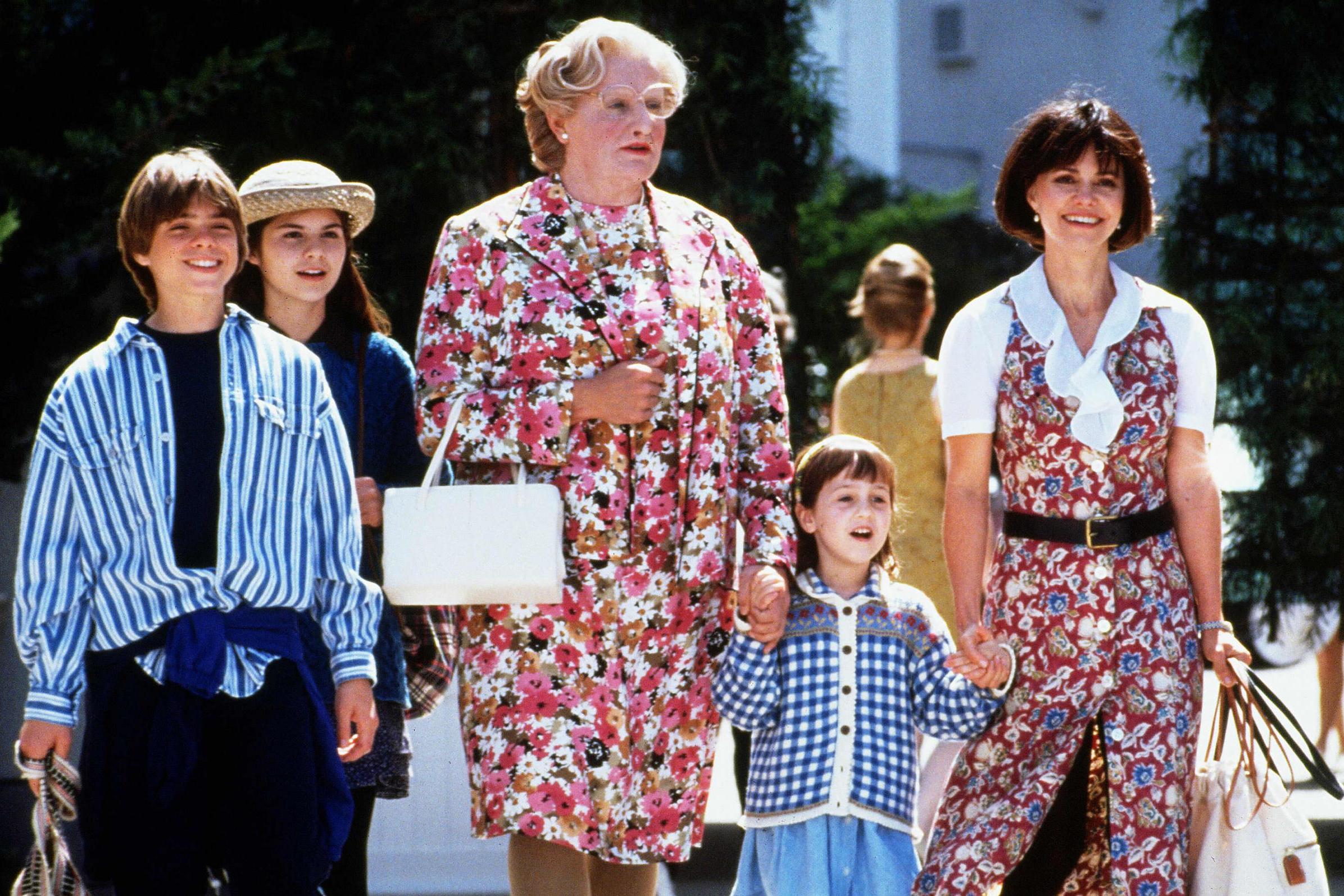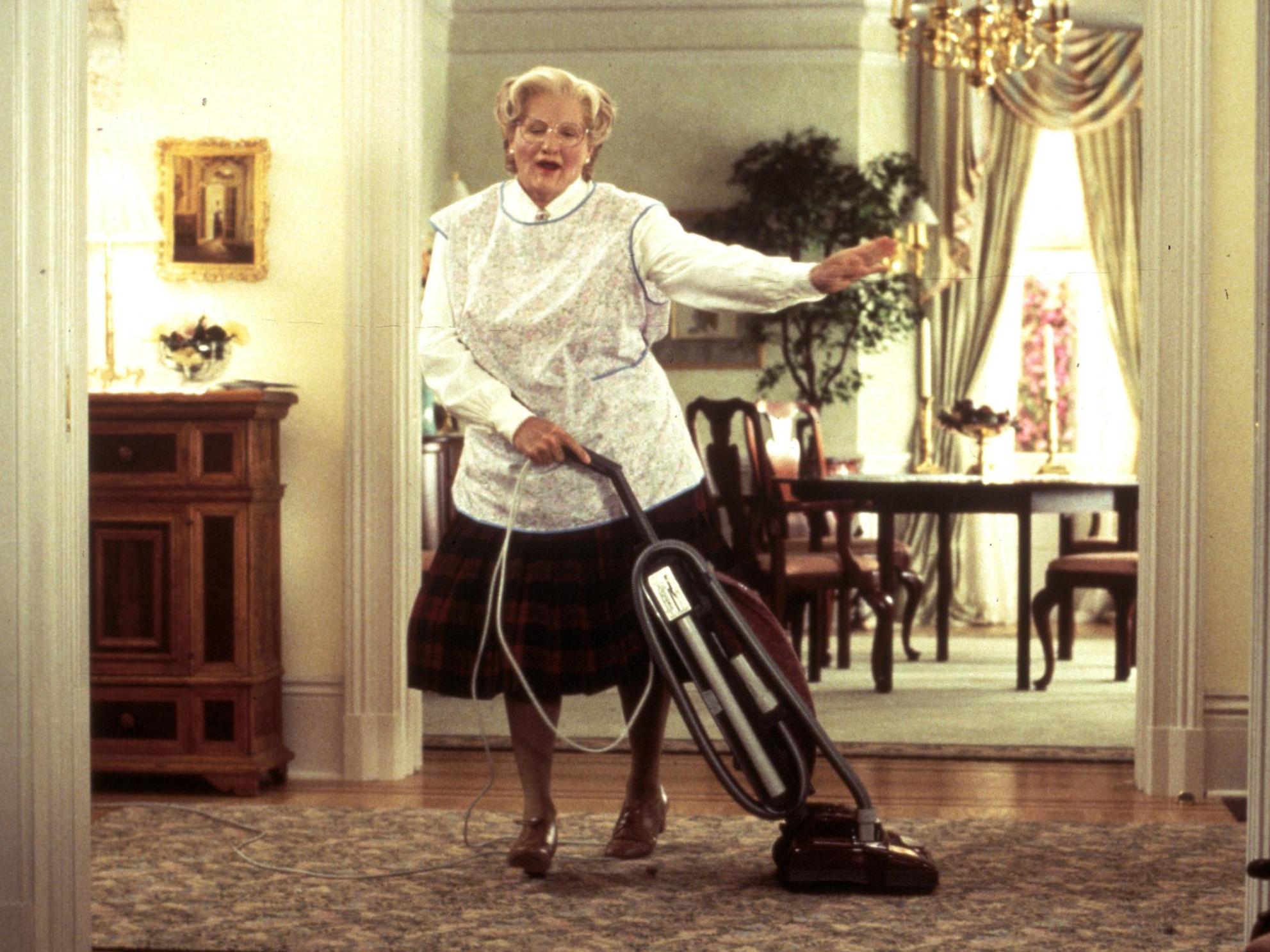Mrs Doubtfire at 25: Why the Robin Williams classic is more than just a panto comedy
As the film celebrates its 25th anniversary, Hugh Montgomery reflects on the legacy of the Nineties' wholesome and striking answer to ‘Some Like It Hot’

Your support helps us to tell the story
From reproductive rights to climate change to Big Tech, The Independent is on the ground when the story is developing. Whether it's investigating the financials of Elon Musk's pro-Trump PAC or producing our latest documentary, 'The A Word', which shines a light on the American women fighting for reproductive rights, we know how important it is to parse out the facts from the messaging.
At such a critical moment in US history, we need reporters on the ground. Your donation allows us to keep sending journalists to speak to both sides of the story.
The Independent is trusted by Americans across the entire political spectrum. And unlike many other quality news outlets, we choose not to lock Americans out of our reporting and analysis with paywalls. We believe quality journalism should be available to everyone, paid for by those who can afford it.
Your support makes all the difference.When the late, great Robin Williams killed himself in 2014, the sheer outpouring of love for him was testament to just what a singular performer he was. Having started out as a virtuosic, motor-mouthed improv comedian, before becoming a household name with sitcom Mork and Mindy, he was equally capable of exhilarating anticness (Good Morning Vietnam, Aladdin) and oceanic melancholy (Dead Poets Society, Good Will Hunting) in his film work. But no production showcases what he could do quite as well as 1993’s Mrs Doubtfire, that cross-dressing farce about a man impersonating a Scottish nanny that celebrates its 25th anniversary on Saturday.
It’s remarkable to remember quite what a hit the film was on its original release. Raking in over $440m worldwide, it was the second-highest earner of 1993, only beaten by Jurassic Park – in today’s terms, an unheard of performance for a live-action comedy. But, to me and a generation of children, it was also more significant than your typical summer blockbuster. In the guise of a broad, brash studio product, here was a film that owned up to the difficulties of family life, and told us they were OK.
Credit for that should go to its oft-forgotten source: Madame Doubtfire, a 1987 novel by the British children’s author Anne Fine that originated the story of a divorcing man dragging up to get access to his kids. Little known in the States, the book was optioned by 20th Century Fox – and Williams warmed to the tale so much that he attached himself as the lead character, Daniel Hillard, before even seeing a script.
With Home Alone’s Christopher Columbus coming on a board as director, it then fell to novice screenwriter Randi Mayem Singer to make the story fit-for-Hollywood-purpose. This she did by relocating the story from Edinburgh to San Francisco and duly lightening some of the book’s darker notes. And while Hillard’s female alter ego retained her Scottishness, she was no longer the product of a wig and some makeup, but a fancy prosthetic makeover.
Discussing his extensive transformation at the time, Williams said it was not so much personally wearing as demoralising for what it revealed to him about the female condition. “I find [heels] the most misogynistic thing ...[and] all the voluntary bondage a woman must put herself through. You do have an appreciation for what is done to make yourself attractive.” As for whether it was hard for him to see the world through the eyes of a 65-year-old British lady? “It was only hot for me,” he wisecracked, in typically flippant style.
The end result, on one level, was a wholesome, suburban answer to Some Like It Hot: a screwball comedy of cross-dressing errors best remembered for the sight of Williams setting fire to his fake breasts or disguising himself with a faceful of cake. You can understand why Fine might have rather cuttingly referred to it as a “pantomime/dance comedy”. Reviews at the time were similarly mixed. “The film is not as amusing as the premise, and there were long stretches when I’d had quite enough of Mrs Doubtfire,” said the revered Roger Ebert. “Mrs Doubtfire, in Mrs Doubtfire, is a lightweight creation that could have done with a shade more flesh on her bones,” wrote Sheila Johnston in The Independent. “There’s not much dramatic mileage in the old girl.”

But what the critics perhaps failed to appreciate – and what its younger audiences did – was the power beneath the pantomime, the wrenching sadness that underscores all the high jinx. Rewatching it now, I’m reminded quite what an impact it had on me back then. Marital estrangement is rarely deemed a suitable subject for family films, and if it is dealt with, it is done so dishonestly: think of Disney classic The Parent Trap, in which a pair of identical twins successfully conspire to happily reunite their divorced parents.
But Mrs Doubtfire is remarkably frank about the sad death of adult relationships. Early on, the film sets out its stall with the breakup scene between Williams’s Hillard and his wife Miranda (Sally Field). While their three children sit on the stairs listening in, Miranda calls time on the relationship with a weary certainty. “We love each other, don’t we?” pleads Williams, a question to which she can offer nothing but a pitiful look. As a 10-year-old whose parents were going through their own troubles, I had never watched something so emotionally unflinching.
Equally striking is the ending: after Williams’s jig is up, his furious wife is granted full custody of the children and his visitation rights are reduced yet further. Finally, however, she realises how much the children are missing him – but only goes so far as to offer him shared custody. It would be difficult to call it a realistic ending – given that Williams’s character would more fittingly be up on charges for stalking and attempting to murder his wife’s new boyfriend (Pierce Brosnan) – but it certainly upended clichés.

Watch Apple TV+ free for 7 days
New subscribers only. £8.99/mo. after free trial. Plan auto-renews until cancelled

Watch Apple TV+ free for 7 days
New subscribers only. £8.99/mo. after free trial. Plan auto-renews until cancelled
Not so much a happily ever after, as a relatively happy compromise, it offered the bold, subversive message, in Hollywood terms certainly, that sometimes families are best when split apart. While my parents separated but subsequently reunited, it was a film that steeled me to understand that whatever family circumstances transpired were meant to be – that made me appreciate, in the words of Williams’ final voiceover, that “some parents when they’re angry, they get along much better when they don’t live together”.
Unsurprisingly, perhaps, the studio initially fought to have Daniel and Miranda reunited, taking Mayem Singer off the project when she refused to change the script. “To me, [the film] was about learning to co-parent and do the right thing when you get divorced ... to give that up was sacrilege,” she told an interviewer recently. With the backing of Williams and Columbus, she and her ending were eventually reinstated.

As much as anything in the script, though, the fact this fake-tits-and-false-teeth farce also manages to be so affecting is down to Williams’s performance, out of drag as much as in. Through his career, the star cornered the market in playing overgrown kids. But he never did so more consummately – or pitiably – than as Hillard, a feckless failure of a husband who is so unworldly he can’t see how exasperating he is.
A lot of the power of his performance, as ever, rests in those sad eyes: no other actor can look quite so piercingly forlorn. (Incidentally, it’s amazing to think that Fine originally wanted Warren Beatty for the role. In the hands of such an alpha male, the film’s cross-dressing antics would almost certainly have been an even blunter instrument and the character a grotesque.)
As for Mrs Euphegenia Doubtfire? What is extraordinary is how fully Williams’s transformation holds up within the drama. “She’s the aunt I never knew,” Williams said of his relationship to her. “I never got to see any of my relatives so maybe she is in essence the one I didn’t have.” Rather than being a mere disguise, she is wholly her own character – comparable to her care-giving predecessor Mary Poppins in her curious mixture of flintiness and reassurance. Even when he’s busted and the latex mask is ripped off, it’s difficult to disabuse yourself of the charade.
Nevertheless, even as the film’s popularity has stood the test of time, it has increasingly had its more problematic aspects picked over, from an incontrovertibly racist Pakistani joke to the conception of its lead character. Don’t think about it too closely, or you might find there’s a fine line between the bitter, somewhat self-righteous Hillard and the kind of grimly self-pitying men’s rights activists who have gained a hold in the conversation these days.
Above all, there’s the question of its transphobia. Mrs Doubtfire is not trans, of course, but fundamentally, however brilliant and winning Williams’s performance as her is, you can’t avoid the discomfort, in more enlightened times, of a film laughing at someone trying to pass as a woman. Indeed, you might say it plays into the very fears currently being spread by anti-trans activists: of men pretending to switch gender to deceive and harm the opposite sex.
As for its afterlife, a sequel was long mooted, before the window of opportunity slammed shut with the star’s death in 2014. Then, in August, a Broadway musical version was announced, though whether the world needs – or will be accepting of – another iteration is a moot point. Like many much-loved but dated works, it’s best left as a product of its era.
Join our commenting forum
Join thought-provoking conversations, follow other Independent readers and see their replies
Comments